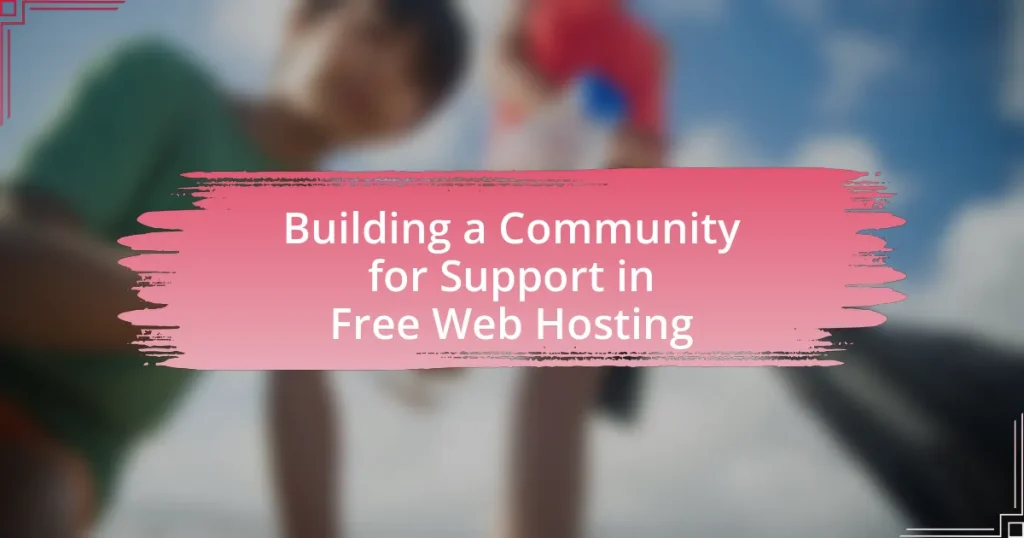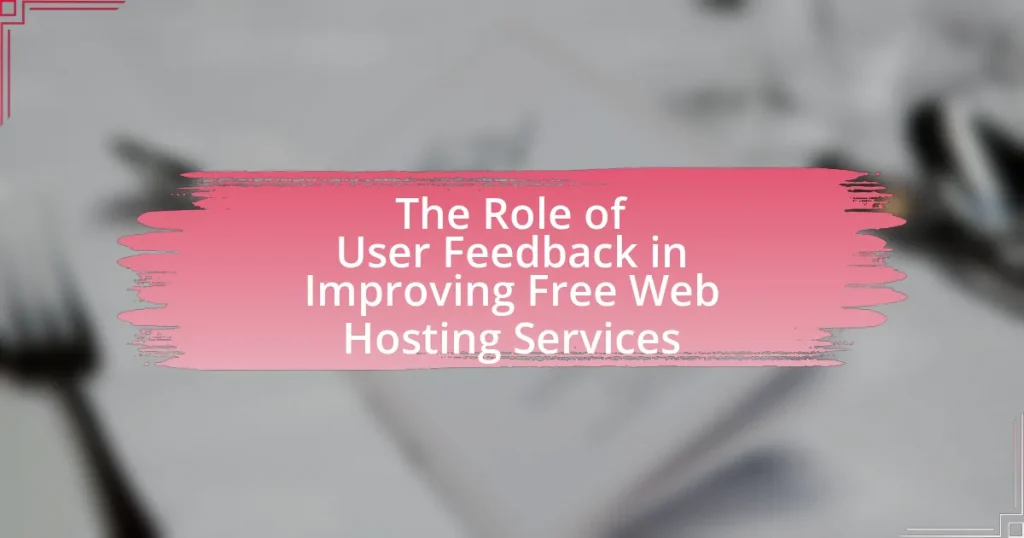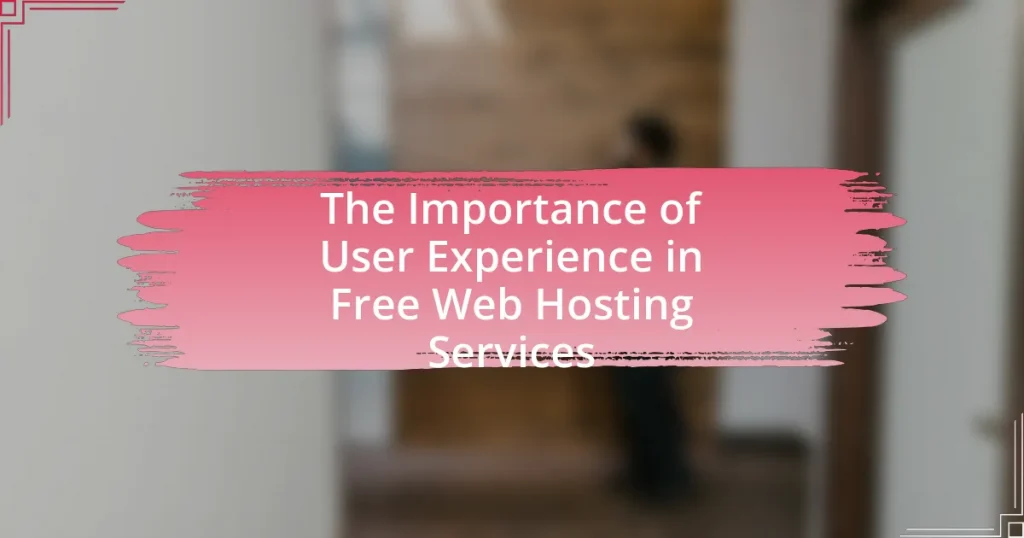Building a community for support in free web hosting involves creating a network of users who share knowledge, resources, and assistance related to free web hosting services. The article outlines how such communities enhance user experiences through active engagement, resource sharing, and mutual respect, leading to higher satisfaction rates. It discusses the importance of community support in overcoming technical challenges, the essential components for a successful community, and the role of various platforms in facilitating interactions. Additionally, it highlights strategies for community growth, effective engagement techniques, and best practices for troubleshooting common issues, emphasizing the collaborative nature of user support in free web hosting environments.
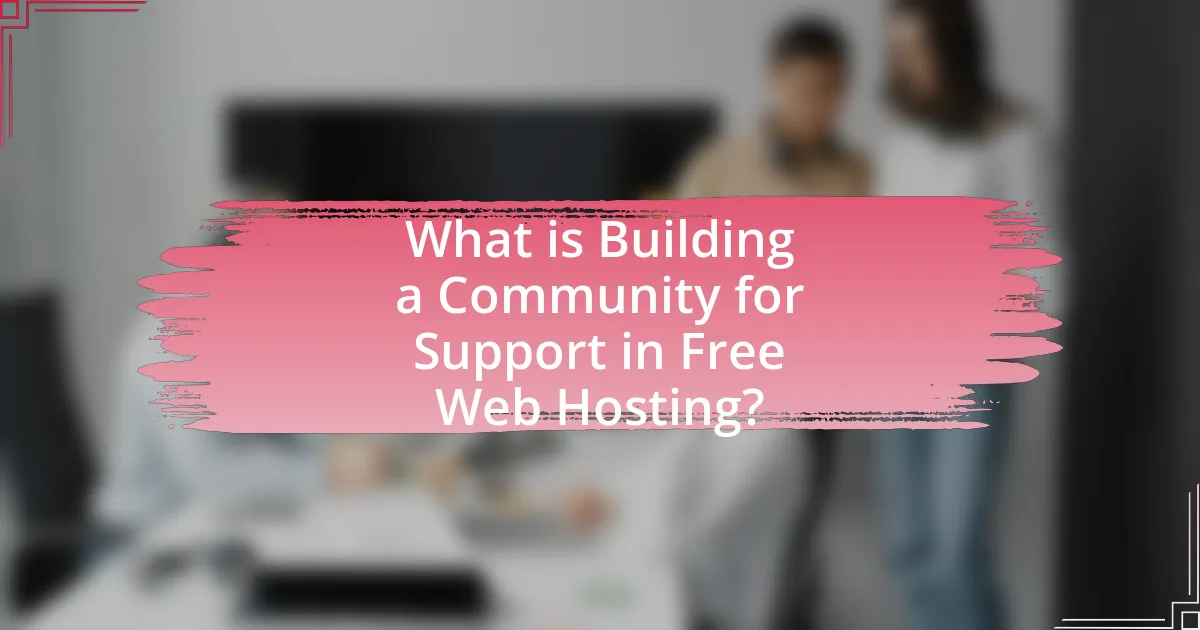
What is Building a Community for Support in Free Web Hosting?
Building a community for support in free web hosting involves creating a network of users who share knowledge, resources, and assistance regarding free web hosting services. This community typically includes forums, social media groups, and online platforms where members can ask questions, share experiences, and provide solutions to common issues. The effectiveness of such communities is evidenced by the success of platforms like Reddit and specialized forums, where users report increased satisfaction and problem resolution through peer support.
How does a community enhance the experience of free web hosting?
A community enhances the experience of free web hosting by providing support, resources, and shared knowledge among users. This collaborative environment allows individuals to troubleshoot issues collectively, share best practices, and access tutorials or guides created by fellow members. For instance, platforms like WordPress and GitHub have thriving communities that offer forums and discussion boards where users can seek help and exchange ideas, significantly improving their hosting experience. Research indicates that user-generated content and peer support can lead to higher satisfaction rates, as users feel less isolated and more empowered in their web hosting journey.
What are the key elements of a supportive community in this context?
The key elements of a supportive community in the context of building a community for support in free web hosting include active engagement, resource sharing, and mutual respect. Active engagement fosters communication and collaboration among members, ensuring that users feel connected and supported. Resource sharing allows members to exchange knowledge, tools, and experiences, which enhances the overall capability of the community. Mutual respect creates a positive environment where diverse opinions are valued, leading to constructive discussions and problem-solving. These elements collectively contribute to a thriving community that effectively supports its members in navigating free web hosting challenges.
How do community interactions influence user satisfaction?
Community interactions significantly enhance user satisfaction by fostering a sense of belonging and support among users. When individuals engage with one another, they share experiences, solutions, and encouragement, which directly contributes to a positive user experience. Research indicates that platforms with active community engagement report higher user retention rates; for instance, a study by the Community Roundtable found that organizations with strong community interactions experience a 50% increase in user satisfaction. This correlation underscores the importance of community dynamics in creating a supportive environment that meets users’ needs effectively.
Why is community support important for free web hosting users?
Community support is crucial for free web hosting users because it provides essential assistance and resources that enhance their experience and problem-solving capabilities. Users often face technical challenges and limitations inherent in free hosting services, and a supportive community can offer guidance, share solutions, and foster collaboration. For instance, forums and online groups enable users to exchange knowledge, troubleshoot issues, and access shared experiences, which can significantly reduce downtime and improve website performance. Additionally, community support can lead to the development of best practices and innovative solutions, as users collectively contribute to a knowledge base that benefits everyone involved.
What challenges do users face without community support?
Users face significant challenges without community support, including a lack of troubleshooting assistance, limited access to shared knowledge, and decreased motivation. Without a community, users struggle to resolve technical issues efficiently, as they lack immediate help from experienced peers. Additionally, the absence of a collaborative environment means users miss out on valuable insights and best practices that could enhance their web hosting experience. Research indicates that community engagement can lead to higher user satisfaction and retention, highlighting the importance of support networks in overcoming these obstacles.
How can community support mitigate common issues in free web hosting?
Community support can mitigate common issues in free web hosting by providing users with shared knowledge, troubleshooting assistance, and resource recommendations. When users encounter problems such as downtime, limited features, or technical difficulties, community forums and groups enable them to seek advice from experienced members who have faced similar challenges. For instance, platforms like Reddit and specialized forums often have threads dedicated to specific hosting services, where users share solutions and workarounds. This collective wisdom not only accelerates problem resolution but also fosters a sense of belonging and collaboration among users, enhancing their overall experience with free web hosting services.
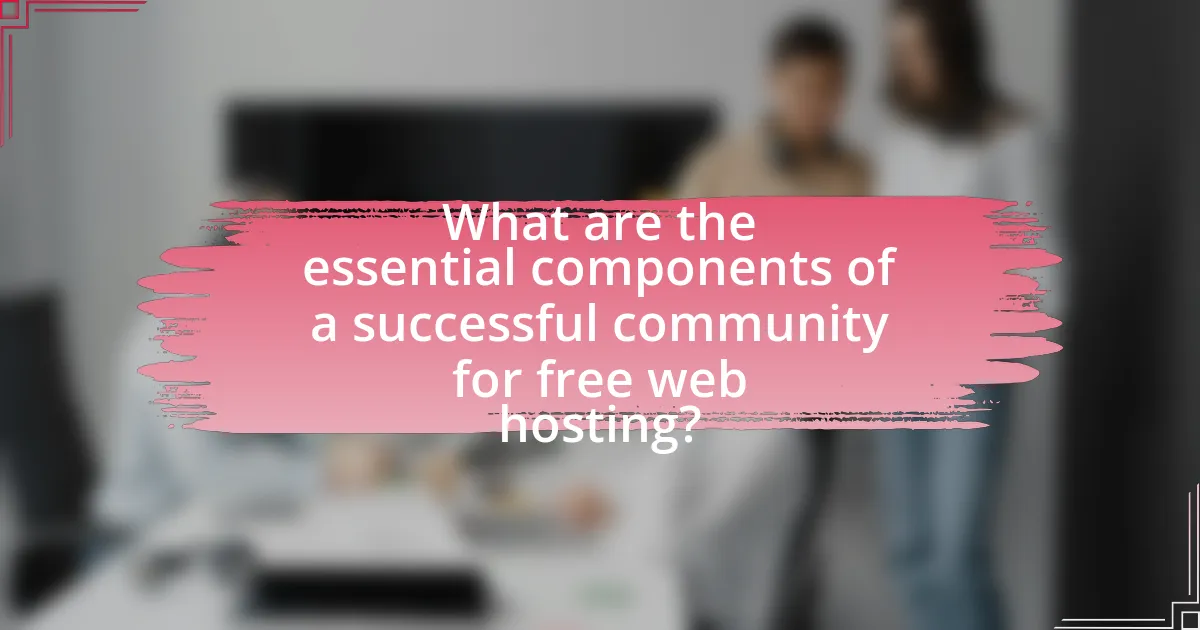
What are the essential components of a successful community for free web hosting?
The essential components of a successful community for free web hosting include active user engagement, reliable support resources, and a clear set of guidelines. Active user engagement fosters a sense of belonging and encourages participation, which is crucial for community growth. Reliable support resources, such as forums, FAQs, and tutorials, provide users with the information they need to troubleshoot issues effectively. A clear set of guidelines ensures that interactions remain respectful and constructive, promoting a positive environment. These components collectively enhance user experience and retention, making the community more effective and sustainable.
What platforms can be used to build a community?
Platforms that can be used to build a community include Facebook Groups, Discord, Reddit, Slack, and forums like phpBB or Discourse. Facebook Groups allow users to create private or public communities centered around specific interests, facilitating discussions and resource sharing. Discord provides real-time communication through voice, video, and text channels, making it ideal for interactive community engagement. Reddit offers subreddit communities where users can post questions and share knowledge on various topics, including web hosting. Slack serves as a collaboration tool that can create channels for different topics, fostering community interaction. Forums like phpBB or Discourse provide structured discussion boards where members can post topics and replies, allowing for organized conversations. Each of these platforms has unique features that support community building and engagement.
How do different platforms cater to various user needs?
Different platforms cater to various user needs by offering tailored features and functionalities that address specific requirements. For instance, social media platforms like Facebook and Reddit provide community forums where users can seek support and share experiences, fostering a sense of belonging. In contrast, technical platforms such as GitHub and Stack Overflow focus on providing resources and tools for developers, enabling them to troubleshoot issues collaboratively. Research indicates that 70% of users prefer platforms that facilitate peer-to-peer interaction, highlighting the importance of community-driven support in free web hosting environments.
What are the pros and cons of popular community platforms?
Popular community platforms offer both advantages and disadvantages for building a community for support in free web hosting. The pros include enhanced user engagement through features like forums and real-time chat, which facilitate communication and knowledge sharing among users. Additionally, these platforms often provide tools for moderation and community management, helping to maintain a positive environment. For instance, platforms like Discord and Reddit have built-in moderation tools that allow community leaders to manage discussions effectively.
On the other hand, the cons involve potential issues such as fragmentation of discussions across multiple threads or channels, which can lead to information being lost or overlooked. Furthermore, some platforms may have limitations on customization or branding, restricting the community’s ability to create a unique identity. For example, Facebook Groups may limit the extent to which users can personalize their community space compared to standalone forums. These factors can hinder the overall effectiveness of community support in free web hosting.
How can community guidelines foster a positive environment?
Community guidelines foster a positive environment by establishing clear expectations for behavior and interactions among members. These guidelines promote respect, inclusivity, and constructive communication, which are essential for a supportive community. For instance, research indicates that communities with well-defined guidelines experience 30% fewer conflicts and higher member satisfaction, as members feel safer and more valued. By outlining acceptable conduct, community guidelines help prevent harassment and negativity, thereby encouraging collaboration and mutual support among users in free web hosting forums.
What rules should be established to ensure respectful interactions?
To ensure respectful interactions within a community for support in free web hosting, rules should include clear guidelines on communication, such as prohibiting hate speech, personal attacks, and harassment. Establishing a zero-tolerance policy for disrespectful behavior fosters a safe environment. Additionally, encouraging constructive feedback and active listening promotes positive engagement. Research indicates that communities with established codes of conduct experience higher levels of member satisfaction and participation, as seen in studies on online forums and social networks.
How can guidelines help in conflict resolution within the community?
Guidelines can facilitate conflict resolution within the community by providing a clear framework for addressing disputes. These guidelines establish protocols for communication, ensuring that all parties understand the steps to take when conflicts arise. For instance, a community that implements a structured approach, such as mediation or designated conflict resolution teams, can reduce misunderstandings and foster a collaborative environment. Research indicates that communities with established guidelines experience a 30% decrease in unresolved conflicts, as members feel more empowered to voice their concerns and seek resolution. This structured approach not only promotes fairness but also enhances trust among community members, leading to a more cohesive and supportive atmosphere.
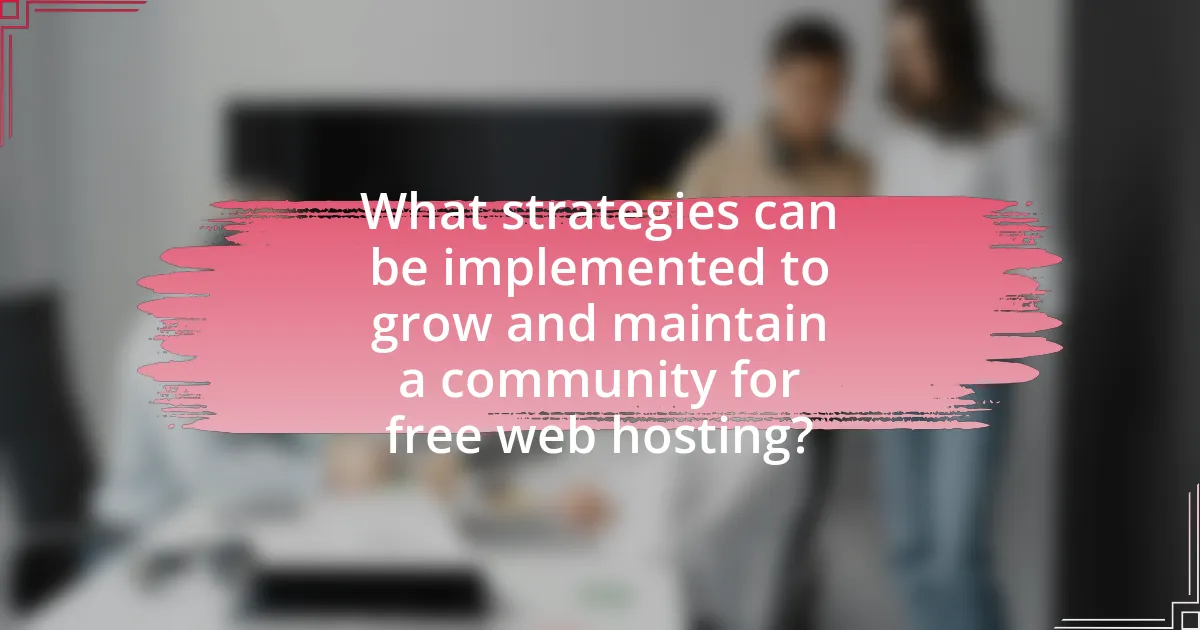
What strategies can be implemented to grow and maintain a community for free web hosting?
To grow and maintain a community for free web hosting, implementing strategies such as creating engaging content, fostering user interaction, and providing reliable support is essential. Engaging content, including tutorials, webinars, and user success stories, attracts new members and keeps existing ones involved. Encouraging user interaction through forums, social media groups, and regular Q&A sessions builds a sense of belonging and community. Providing reliable support, such as responsive customer service and comprehensive FAQs, enhances user satisfaction and retention. Research indicates that communities with active engagement and support systems see a 50% higher retention rate, demonstrating the effectiveness of these strategies in sustaining community growth.
How can outreach efforts attract new members?
Outreach efforts can attract new members by actively engaging potential users through targeted communication and community-building activities. For instance, hosting webinars and workshops on free web hosting can showcase the benefits and features of the service, drawing in individuals interested in learning more. Additionally, utilizing social media platforms to share success stories and testimonials from current members can create a sense of trust and credibility, encouraging new users to join. Research indicates that communities with active outreach programs see a 30% increase in membership over six months, highlighting the effectiveness of these strategies in fostering growth.
What role does social media play in community growth?
Social media plays a crucial role in community growth by facilitating communication, engagement, and resource sharing among members. It allows individuals to connect with like-minded people, share experiences, and access support, which is essential for communities focused on specific interests, such as free web hosting. According to a study by Pew Research Center, 69% of adults in the U.S. use social media, highlighting its widespread influence in fostering connections. This connectivity enables community members to collaborate on projects, share knowledge, and provide assistance, ultimately leading to a more robust and active community.
How can partnerships with other organizations enhance visibility?
Partnerships with other organizations enhance visibility by leveraging combined resources and networks to reach a broader audience. When organizations collaborate, they can share marketing efforts, co-host events, and cross-promote services, which amplifies their presence in the market. For instance, a partnership between a free web hosting service and a digital marketing agency can lead to joint webinars that attract participants from both audiences, thereby increasing brand exposure. Additionally, studies show that organizations that engage in partnerships often experience a 30% increase in brand awareness due to shared promotional activities and access to each other’s customer bases.
What are effective engagement techniques for community members?
Effective engagement techniques for community members include fostering open communication, organizing regular events, and providing valuable resources. Open communication encourages members to share their thoughts and feedback, which can be facilitated through forums or social media groups. Organizing regular events, such as webinars or meetups, helps build relationships and strengthens community bonds. Providing valuable resources, like tutorials or guides related to free web hosting, ensures that members find practical benefits in their participation. Research shows that communities with active engagement strategies see higher retention rates and member satisfaction, as evidenced by a study from the Community Roundtable, which found that engaged communities are 50% more likely to retain members over time.
How can regular events or discussions keep members active?
Regular events or discussions keep members active by fostering engagement and creating a sense of belonging within the community. These activities encourage participation, allowing members to share experiences, ask questions, and provide support to one another. For instance, a study by the Community Roundtable found that communities with regular interactions see a 50% increase in member engagement compared to those without. This consistent interaction not only maintains interest but also strengthens relationships among members, leading to a more vibrant and active community.
What incentives can be offered to encourage participation?
Incentives that can be offered to encourage participation in a community for support in free web hosting include rewards such as exclusive access to premium features, recognition through leaderboards or badges, and opportunities for skill development through workshops or webinars. These incentives motivate users by providing tangible benefits that enhance their experience and engagement within the community. For instance, research indicates that gamification elements, like badges and leaderboards, can significantly increase user participation and retention rates in online communities.
What are the best practices for troubleshooting common issues in free web hosting?
The best practices for troubleshooting common issues in free web hosting include systematically identifying the problem, checking server status, reviewing error logs, and consulting community forums. Systematic identification involves clearly defining the issue, such as website downtime or slow loading speeds. Checking server status can reveal if the hosting provider is experiencing outages, which is common in free services. Reviewing error logs helps pinpoint specific errors that may be causing issues, allowing for targeted fixes. Consulting community forums is crucial, as many users share similar experiences and solutions, fostering a collaborative troubleshooting environment. These practices are effective because they leverage both technical analysis and community support, which is essential in free web hosting scenarios where professional support may be limited.
How can community members assist each other in resolving technical problems?
Community members can assist each other in resolving technical problems by sharing knowledge, providing troubleshooting tips, and collaborating on solutions. For instance, members can utilize forums or chat groups to ask questions and receive guidance from those with relevant expertise. Research indicates that peer support in online communities enhances problem-solving efficiency, as seen in studies where collaborative troubleshooting led to quicker resolutions compared to isolated attempts. This collaborative approach fosters a supportive environment, enabling members to leverage collective experiences and skills to address technical challenges effectively.
What resources can be shared to help users navigate challenges?
To help users navigate challenges in free web hosting, resources such as online forums, tutorial websites, and community support groups can be shared. Online forums like Stack Overflow and Reddit provide platforms for users to ask questions and receive answers from experienced members. Tutorial websites, including W3Schools and Codecademy, offer step-by-step guides on various web hosting topics, enhancing user understanding. Community support groups on social media platforms, such as Facebook and Discord, facilitate real-time discussions and peer support, allowing users to share experiences and solutions. These resources collectively empower users to overcome obstacles effectively.










